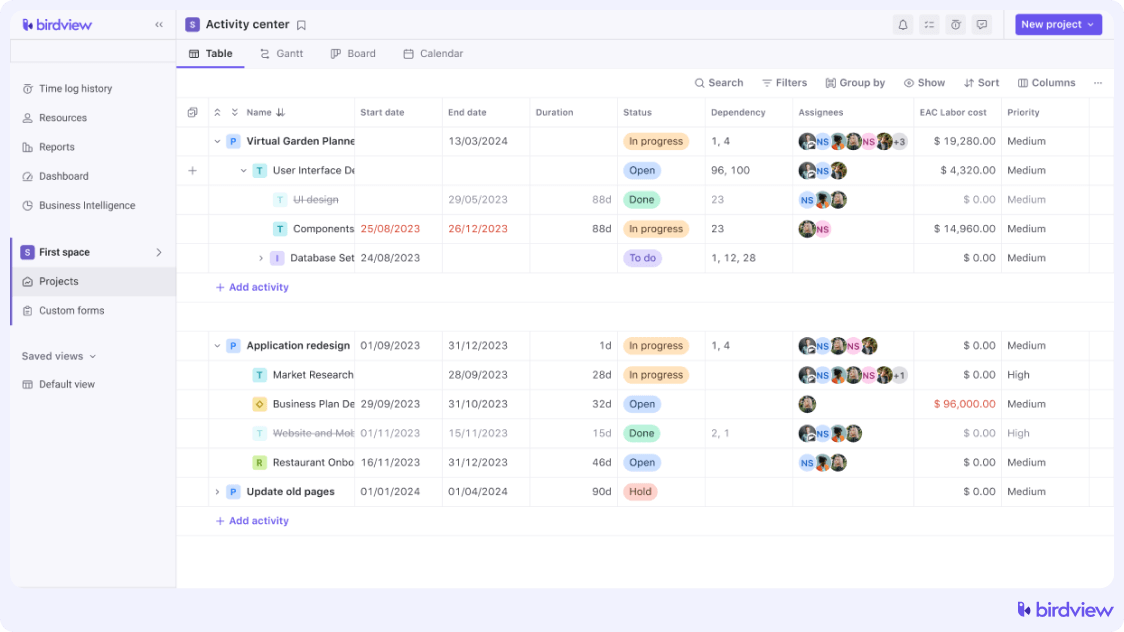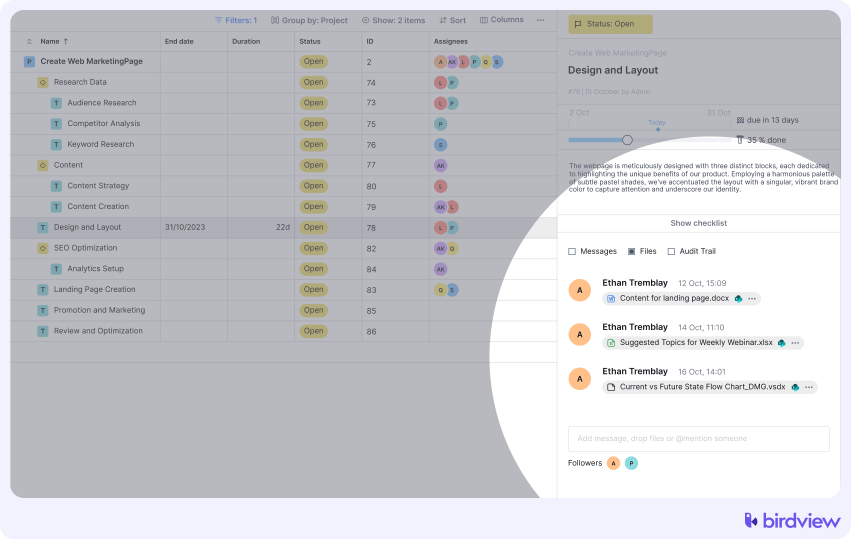When thinking about project management as a whole, the concept can be both a faithful friend and a dreadful enemy. It can help your company grow fast when implemented correctly, or it can destroy you in a matter of a few projects. It‘s all a matter of how you look at things.
To get your project and company from where you are to where you want to be, you need to find the right balance of things. You need to utilize all the strengths of project management while making sure you don‘t push over the limits.
Project management strengths
Let‘s use logic and statistics to define the strong sides of project management tools. What does it take to run a successful project? The right set looks like this:
- Effective communication – an average of 75% of projects met their original goals on time and within budget with the help of effective communication. Birdview’s collaboration tools, such as instant messaging, project updates, and shared dashboards, enable seamless team communication, ensuring everyone is on the same page.

- Frequent communication – teams that practice relevant, frequent communication achieve an average of 82% project success. In contrast, 57% of teams that communicate poorly fail their projects.
- Detailed planning – Communication can really make a difference only when it leads to something relevant. With a detailed plan at hand, frequent communication makes all the more sense since you can align everything with your current plan and goals. Also, figures indicate that 39% of projects fail due to inefficient planning and lack of activities. Birdview‘s project planning tools allow project managers to create detailed plans that align with organizational goals.

- Knowledge transfer – Smart project managers know that it‘s not enough to understand project goals themselves: you need to deliver them to your team very clearly and share your knowledge on the matter. When implemented, knowledge transfer improves overall team performance twice as much (75% to 35%) as compared to keeping everyone in the dark. With Birdview‘s document management and knowledge-sharing features, project managers can easily share key insights and project goals with their teams.

- Using a methodology – Project management methodologies were created because they deliver results. It may be too hard to come up with your own unique methodology that fits your team best, and until you get there, using a proven methodology can improve your overall results, including meeting deadlines and quality standards and staying on budget by 10%.
Read more:
- Using Online Project Management Software – 87% of high-performing companies use project management software for their everyday activities. This is very important to consider since software helps skip a lot of time-consuming tasks and helps tackle miscommunication, paperwork, loss of valuable data, loss of the big picture, and much more. It‘s no wonder that every 9 out of 10 companies utilize project and Resource Planning Software – it has been designed to help you guys out.
This list could also include a few dozen other points, but the core skill set consists of those techniques. It‘s important to note that all of this will work only if practiced regularly: running a project successfully is a team effort by itself and it‘s hard to get everything lined up nicely from the first try. But if you stick to it, you will notice considerable improvements with every coming project.

Project management limits
All those strengths mentioned above are good in moderation. Too much effort can really mess up everything starting from your deadlines and ending with a team attitude toward your job.
- Micromanagement – concentrating on every small detail in every task for every team member is something you want to stay far, far away from. Micromanagement is very easy to fall for. While delivering your vision and communicating frequently is important, it can easily grow into micromanagement without you even noticing. There is no need to oversee every tiny step that your team takes, you will get nothing but frustration and loss of time out of it.
- Constantly striving for perfection – No matter how hard you try, you won‘t be able to make everything perfect, simply because all the activities include too many factors that are out of your direct influence. Chasing perfect plans and teamwork will soak up a ton of time, which could be used effectively for problem-solving, risk management, etc. You will just end up where you started (if not in a worse state) and achieve nothing but the loss of time and effort.
- Working 24/7 – This might sound misleading, but working late every day trying to speed up your results isn‘t going to help as much as you think. Productivity isn‘t going to improve if you stress yourself every day and cut your sleep and/or relaxation time. You are not a machine and you need to rest, have fun, and put your mind off work regularly. The same goes for your team. Instead of working late every night and getting stressed over stuff that isn‘t going to improve anytime soon, use that time to get to know your teammates outside of work and tighten bonds between everybody. This will help improve your project’s success and overall atmosphere much more.
It can be very tricky to find the right balance between what you do, and what you need to be doing, and making sure the project doesn‘t become a nightmare for yourself and your team. Stick to the advice you get from experienced professionals and work towards developing your own working style that fits your team best. It‘s a slow, but steady way to improve the number of successful projects.



